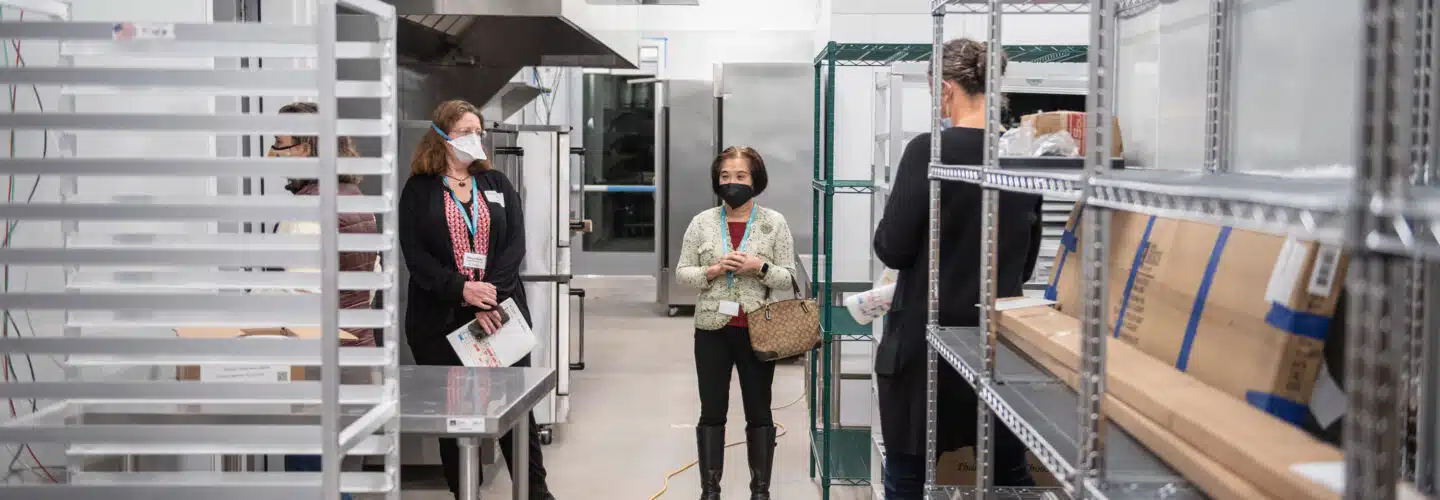Fora Health is proud to have so many staff who’ve been with the company for over a decade – and the staff member with the longest tenure at Fora is our Food Services Manager, Mai, who just celebrated her 23rd year! She’s seen a lot of transformation and growth over the years since our De Paul days and this is her story.
Mai started at De Paul in 2001 as a part-time dietician. “They never had a dietitian before. However, due to the increase in demand for specialty diets, they needed somebody who could discuss specialty diets with the patients. During that time, I had to write up the policy and create a specialty manual for the patients.”
After only 60 days, things changed quickly for Mai when the Food Service Manager at the time resigned. “The CFO who oversaw my department asked me if I wanted to become a full-service manager/dietitian, and I said no problem. I will be full-time. I took over the whole kitchen, managed the kitchen staff, met with patients and reviewed their diets.” Mai has remained in that position to this day.
Mai originally didn’t have an office because it was thought that she’d only be in the kitchen. However, she needed space to meet with patients and discuss their diets and had to do this from the pantry closet. Mai also noted other challenges: “When I first came in, there was no front desk at the lobby. On the first floor, there was just a small desk. Visitors, patients, and everything would all be right there. So, it was overwhelming for anyone visiting, checking in, interviewing and more”
Space was a premium in general and not having an elevator even made it more challenging. Everything had to be carried via human hands. She also had to get creative with storing food in the basement, creating conga lines of staff to transport food deliveries to the kitchen, and felt that at a certain point, they’d outgrown the building. And the staff at large would have to get creative in determining who could use what rooms and offices for interviews, patient groups, storage and more.
Funding was also a challenge and said, “We were working with the food bank to get some donated at that time, we asked patients to bring in their STEM to help subsidize food costs. And that still wasn’t enough. We would do 1/3rd from STEM and 2/3rd from our budget.”
Despite the limitations of the downtown location, staff made the most of the space with what they had to continue high-quality service for patients. However, when our prior CEO Maree Wacker joined De Paul in 2015 and saw the functional challenges of the building, she felt it was time to expand and said the organization couldn’t do this for much longer. That led to the transformation of Fora to De Paul and moving from Downtown Portland to outer SE in Gateway.
“To this day, I still cannot believe that we have this new building,” said Mai. She didn’t think they’d ever leave downtown. Mai said she would “never forget” doing the first walkthrough of Fora’s new kitchen and when patients ate there for the first time. “It was emotional. I say this for real. They said ‘oh my God’ it looks legit, like a restaurant!”
The new kitchen allowed for more flexibility, scale and organization for the kitchen staff that allow for higher-quality meals. And Mai has noticed an increased interest in specialty diets in recent years now that patients see how crucial diet is to recovery. “Their approach now is more wholesome. When they see vegetarian people, when you see people who eat no beef and no pork or a low-fat diet, they look at that and they say, oh, that’s good and something that I could commit myself to.”
After over 20 years of service, Mai is still incredibly passionate about the work we do at Fora and her role in it. “We treat them with respect. We are here to take care of them in a building that is not rundown and not like, oh, yeah, no, you don’t deserve that. They do deserve that. And we deserve to have a space to make all these wonderful meals for them.”


